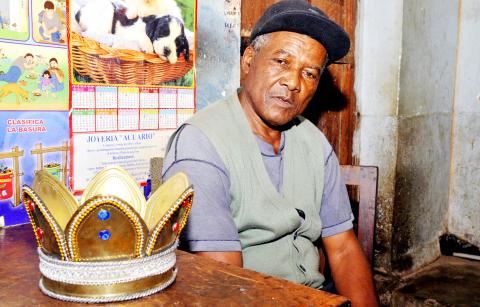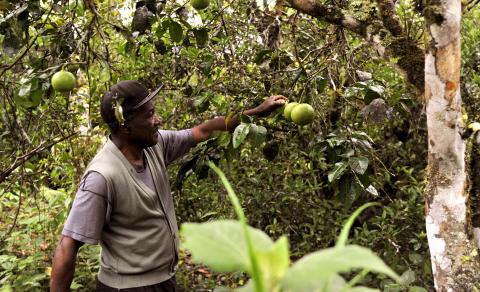He does not have Queen Elizabeth II’s throne or Kate and Wills’ paparazzi, but Bolivian peasant Julio Pinedo is New World royalty: a king who inherited his title from his African ancestors.
Pinedo’s calloused hands, the mark of a lifetime of farming, belie the royal blood passed down to him by the Congolese prince Uchicho, who was taken to the Americas as a slave sometime around 1820.
In the nearly two centuries since then, Afro-Bolivians have lost their languages, religions and much of their history, but Pinedo’s family has managed to hold onto its royal heritage.

Photo: AFP
Today he is recognized as a king by Bolivia’s black community, about 26,000 people descended from the slaves imported under Spanish colonial rule from the 16th to the 19th centuries.
Pinedo, 73, lives in the small village of Mururata, about a two-hour drive north of the capital, La Paz, where he still goes out to the fields every day to farm citrus fruits, coca and coffee.
“When the Spanish invaded they brought my ancestors here. They brought them to the area to work the land,” he said.

Photo: AFP
Orphaned as a young boy when his parents died in an accident, Pinedo was raised by his grandfather Bonifacio, who was crowned king in 1932.
He succeeded his grandfather in 1992, but his official coronation ceremony was only held in 2007.
Pinedo does not have a throne or a court, but he does have a red cape with gold embroidery and a metallic crown, which he wears for local festivals. His title is mainly symbolic, he said.
His sole heir, Prince Roland, works as an office clerk at the Bolivian Congress, while his wife, Queen Angelica Larrea, runs a small shop whose shelves offer a scattering of sodas, sardine tins, cooking oil and bread.
According to the story passed down in the family, prince Uchicho was kidnapped and sold into slavery in the dying days of the Spanish empire. Shipped to Bolivia, he was forced to work on the coca plantations in Los Yungas, the agricultural region where Pinedo still lives.
Today, Pinedo’s image is “a strong source of cultural identity and belonging” for Afro-Bolivians, said Jorge Medina, Boliva’s first black congressman.
Historians do not know exactly how many slaves made the so-called Middle Passage from Africa to the Americas, but the number is in the tens of millions. Up to half died along the way of starvation, disease and brutal treatment.
In Bolivia, which was then the colonial territory of Upper Peru, the slaves were forced to work the silver mines in the city of Potosi and the plantations of Los Yungas.
“We believe that about half a million slaves arrived in Upper Peru, but there are no exact figures. First they brought us to Potosi, then here to Los Yungas,” said Pedro Andaveres, a researcher who specializes in Afro-Bolivian culture.
Most traces of those ancestors have been lost, Andaveres said, adding: “They erased our history, they erased our original dialects, they erased our religions.”
However, Bolivian culture today bears a distinct African imprint that can be heard in its Andean music and seen in the saya and caporales dances set to the rhythms of African drums. And Afro-Bolivians still have their king.
“He’s our symbolic king. We don’t pay tribute to him like a Spanish king, but people respect him,” Medina said.

Tens of thousands of Filipino Catholics yesterday twirled white cloths and chanted “Viva, viva,” as a centuries-old statue of Jesus Christ was paraded through the streets of Manila in the nation’s biggest annual religious event. The day-long procession began before dawn, with barefoot volunteers pulling the heavy carriage through narrow streets where the devout waited in hopes of touching the icon, believed to hold miraculous powers. Thousands of police were deployed to manage crowds that officials believe could number in the millions by the time the statue reaches its home in central Manila’s Quiapo church around midnight. More than 800 people had sought

DENIAL: Pyongyang said a South Korean drone filmed unspecified areas in a North Korean border town, but Seoul said it did not operate drones on the dates it cited North Korea’s military accused South Korea of flying drones across the border between the nations this week, yesterday warning that the South would face consequences for its “unpardonable hysteria.” Seoul quickly denied the accusation, but the development is likely to further dim prospects for its efforts to restore ties with Pyongyang. North Korean forces used special electronic warfare assets on Sunday to bring down a South Korean drone flying over North Korea’s border town. The drone was equipped with two cameras that filmed unspecified areas, the General Staff of the North Korean People’s Army said in a statement. South Korea infiltrated another drone

COMMUNIST ALIGNMENT: To Lam wants to combine party chief and state presidency roles, with the decision resting on the election of 200 new party delegates next week Communist Party of Vietnam General Secretary To Lam is seeking to combine his party role with the state presidency, officials said, in a move that would align Vietnam’s political structure more closely to China’s, where President Xi Jinping (習近平) heads the party and state. Next week about 1,600 delegates are to gather in Hanoi to commence a week-long communist party congress, held every five years to select new leaders and set policy goals for the single-party state. Lam, 68, bade for both top positions at a party meeting last month, seeking initial party approval ahead of the congress, three people briefed by

Cambodia’s government on Wednesday said that it had arrested and extradited to China a tycoon who has been accused of running a huge online scam operation. The Cambodian Ministry of the Interior said that Prince Holding Group chairman Chen Zhi (陳志) and two other Chinese citizens were arrested and extradited on Tuesday at the request of Chinese authorities. Chen formerly had dual nationality, but his Cambodian citizenship was revoked last month, the ministry said. US prosecutors in October last year brought conspiracy charges against Chen, alleging that he had been the mastermind behind a multinational cyberfraud network, used his other businesses to launder